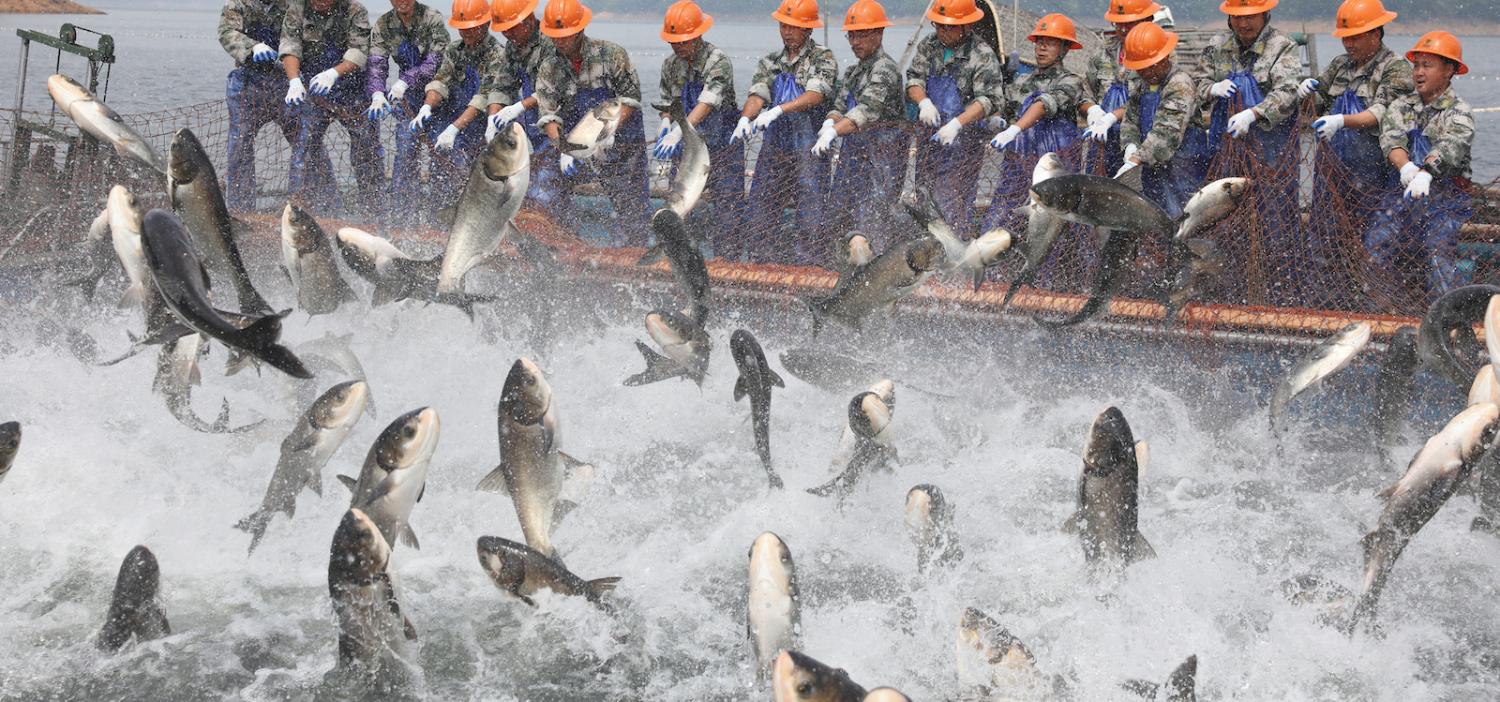China’s fishing fleet has been at the forefront of disputes in the South China Sea, and the expansion of China's fleet into the South Pacific and the Indian Ocean may soon create new security headaches for Australia.
In 2013, the decline of fish stocks in Chinese waters, together with China’s growing demand for protein, led Xi Jinping to urge his nation’s fishermen: "Build bigger ships and venture even farther into the oceans and catch bigger fish."
With some 2,500 distant waters fishing vessels, China’s heavily subsidised fishing industry is the world’s largest, and it is pushing into ever more distant waters. The World Bank estimates that China will account for some 37% of the global catch by 2030, many times that of any other country.
China is hardly the first country to exploit far-away fisheries or engage in illegal fishing, but never has it occurred on such a scale. The appearance of the Chinese fleet throughout the world is now a significant factor in the sustainability of fish stocks from Argentina to West Africa and from Somalia to Kiribati.
There is a good chance that fishing will become a key locus of disputes and incidents involving China.
But despite serious and well-founded environmental concerns, this is not just about fish. The impact of Chinese fishing has important strategic consequences for Australia’s region in several ways. There is a good chance that fishing will become a key locus of disputes and incidents involving China. The collapse in fish stocks due to overfishing could have even greater implications for the region.
It seems likely that bigger fishing fleets chasing declining stocks will likely make fishing an ever more contested activity. Competition over access to fisheries will put states under greater pressure to assert claims and to police their national exclusive economic zones (EEZ).
More and more disputes are likely between Chinese and local fishers, and with local enforcement authorities. Disputes could also increasingly involve non-government organisations such as Sea Shepherd, which has worked with local authorities to catch illegal Chinese fishers in Gabon, Tanzania, and Timor Leste.
Fishing disputes could easily create a new set of regional flashpoints. Chinese fishers often show unusual assertiveness and there have been several instances of them using force against local authorities. In 2016, an Argentine coast guard vessel was forced to fire on a Chinese fishing boat that refused to stop in Argentina’s EEZ. Ultimately the fishing boat sank after it tried to ram the Argentine ship, eliciting strong protests from Beijing.
Greater involvement by the Chinese navy and other maritime agencies can also be expected in support of Chinese fishers. In another instance in 2016, Chinese Coast Guard vessels intervened in or near Indonesian territorial waters to forcibly free a Chinese fishing vessel that had been detained by Indonesian authorities for fishing in the Indonesian EEZ. A recent report by former Navy rear admiral James Goldrick maps these sorts of grey zone operations in the maritime domain.
Other factors can also substantially complicate or heighten disputes with Chinese fishers. One is the growing use of armed private security contractors, already being seen in the Indian Ocean. Another is the Chinese Navy’s use of “Sea Phantom”, intelligence vessels disguised as fishing boats. These may be operating in or near Australian waters, in addition to the overt intelligence ships reported in 2017. What happens when local enforcement authorities intervene against these boats?
Of even greater concern is the consequence of a collapse in fish stocks. The UN’s Food and Agriculture Organisation has estimated that 90% of the commercial fish stocks it tracks have been overfished or fully fished, including the world’s 10 most commercially productive species. This problem will only worsen, due to growing demand, falling fish stocks and poor enforcement arrangements.
This may be compounded by climate change. A recent French study of fish stocks in the Indian Ocean documents the discovery of two “dead zones”, one in the Arabian Sea and another in the Bay of Bengal, where few creatures live in oxygen-depleted water.
As a report by the US National Intelligence Council argued, threats to the sustainability of fisheries in the Indian Ocean and South China Sea could pose a “chronic and widespread challenge” to US interests. Australia has even more direct interests.
The loss of regional fishing grounds could have a severe impact on littoral communities, creating a variety of security threats. The destruction of Somali fishing grounds by illegal fishers was a key factor in impoverished local fishermen turning to piracy. This sparked an international naval build-up in the western Indian Ocean over the last decade which has had far-reaching consequences for the region.
Many countries in our region rely heavily on fish for food and as a source of income. In Indonesia, for example, fish accounts for more than 50% of total protein intake and the fishing industry employs some 12 million people. The loss of fisheries for such countries could contribute to violent extremism, political instability and potentially even large-scale population movements.
What does this mean for Australia? The big take-away is the need to address fishing sustainability as a security as well as an environmental issue. It means Australia will need to put even more effort into building effective multilateral fisheries management systems in Southeast Asia, the South Pacific and Indian Oceans.
Australia also has an important role to play in building the capacity of regional coastguards to enforce national jurisdictions. Foreign Minister Marise Payne’s recent announcement of a regional maritime domain awareness centre for the South Pacific was largely driven by the need to help our neighbours protect their fish stocks.
But Australia also needs to pay serious attention to helping its neighbours in Southeast Asia and the Indian Ocean, where many millions of people depend on fishing.

